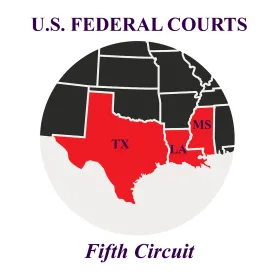On August 18, 2023, in Hamilton v. Dallas County, the full Fifth Circuit Court of Appeals upended long-standing precedent, significantly broadening the types of adverse employment actions that could give rise to an actionable claim. Prior to this decision, and for nearly thirty years, Fifth Circuit precedent required a plaintiff under Title VII of the Civil Rights Act of 1964 to show he or she had been subjected to an “ultimate employment decision” to state a cognizable discrimination claim.
Quick Hits
- In an August 18, 2023, decision, the Fifth Circuit reasoned that to limit disparate treatment claims to those involving ultimate employment decisions ignored the “terms, conditions, or privileges of employment” language of the anti-discrimination provision.
- The Fifth Circuit held that “[t]he days and hours one works are quintessential ‘terms or conditions’ of one’s employment.”
- The Fifth Circuit held that Title VII “does not permit liability for de minimis workplace trifles,” but left open the question of the minimum level of harm that needs to be associated with any claim predicated on the “terms, conditions, or privileges of employment” language of Title VII’s anti-discrimination provision.
Background
In April 2019, the Dallas County Sheriff’s Department transitioned from a seniority-based scheduling policy to a gender-based scheduling policy pursuant to which only male detention offers were given full weekends off from work. In contrast, the female detention officers were limited to either two weekdays off or one weekday and one weekend day off. A sergeant with the sheriff’s department admitted that the new scheduling policy was based on gender and explained it would be unsafe for all the men to be off during the week and that it was safer for the men to be off on the weekends.
On February 10, 2020, nine female detention officers filed suit against Dallas County for violations of Title VII and the Texas Commission on Human Rights Act (TCHRA). Relying on Title VII’s anti-discrimination provision, the female officers claimed that the county had “engaged in the practice of discrimination with respect to the terms and conditions of Plaintiffs’ employment.”
Dallas County moved to dismiss the complaint. While recognizing the county’s scheduling policy to be “facially discriminatory,” the district court dismissed the officers’ complaint pursuant to near thirty-year-old Fifth Circuit precedent that limited adverse employment actions to “ultimate employment decisions,” such as hiring, granting leave, discharging, promoting, or compensating.
On appeal, a panel for the Fifth Circuit observed that the officers had alleged direct evidence of discrimination, which courts “rarely encounter[].” The court further noted that the conduct complained of by the female officers “fit[] squarely within the ambit of Title VII’s proscribed conduct: discrimination with respect to the terms, conditions, or privileges of one’s employment because of one’s sex.” Nevertheless, the court affirmed the dismissal because circuit precedent “constrain[ed] [the court] to conclude … the denial of weekends off is not an ultimate employment decision.” The panel noted, however, that the “strength of the allegations” in the case presented an “ideal vehicle for the en banc court to reexamine [the] ultimate-employment-decision requirement and harmonize [the Fifth Circuit’s] case law with [its] sister circuits’ to achieve fidelity to the text of Title VII.”
En Banc Decision
On August 18, 2023, the en banc Fifth Circuit reversed and remanded, holding that a plaintiff need not show an “‘ultimate employment decision,’ a phrase that appears nowhere in the statute and that thwarts legitimate claims of workplace bias” to state a “plausible claim of discrimination under Title VII.” The court reasoned that the ultimate-employment-decision requirement rendered the “catchall provision” of Title VII’s anti-discrimination provision—the “terms, conditions, or privileges of employment” text—meaningless.
Nowhere does Title VII say, explicitly or implicitly, that employment discrimination is lawful if limited to non-ultimate employment decisions. To be sure, the statute prohibits discrimination in ultimate employment decisions—“hir[ing],” “refus[ing] to hire,” “discharge[ing],” and “compensation”—but it also makes it unlawful for an employer “otherwise to discriminate against” an employee “with respect to [her] terms, conditions, or privileges of employment.” (Emphasis in original.)
In considering the detention officers’ allegations, the Fifth Circuit noted “little difficulty concluding that they ha[d] plausibly alleged discrimination ‘with respect to [their] … terms, conditions, or privileges of employment.” The court went on to hold “[t]he days and hours one works are quintessential ‘terms or conditions’ of one’s employment.” Further, the officers’ allegations supported a “plausible inference that the right to pick work shifts based on seniority is a ‘privilege’ of employment with the County,” such that the County’s shift from a seniority-based system to a gender-based system “plausibly denied the Officers the ‘privilege’ of seniority because of their sex.”
The county argued that a plaintiff should be “require[d] … to show—in addition to discrimination with respect to the ‘terms, conditions, or privileges of employment’”—some sort of harm, since “Title VII liability does not extend to ‘de minimis’ discrimination.” The Fifth Circuit recognized “some merit” to the county’s argument, as nearly every other circuit has adopted some minimal level of actionable harm. While recognizing that Title VII “does not permit liability for de minimis workplace trifles,” the court declined to define the bare minimum of actionable harm required when a plaintiff alleges discrimination in the terms, conditions, or privileges of employment.
The court reasoned that “whatever standard” it might apply—whether a “materially adverse employment action,” a “tangible employment action,” or an “objective material harm requirement”—it was “eminently clear that the officers’ allegations would satisfy it at the pleading stage” as the allegations were “far more than ‘de minimis.’” (Emphasis added.) “We thus leave for another day,” the court stated, “the precise level of minimum workplace harm a plaintiff must allege on top of showing discrimination in one’s ‘terms, conditions, or privileges of employment.’”
Notably, three judges concurred in the judgment only. In a separate opinion by Judge Edith H. Jones, these judges argued that the majority’s approach left open the question as to “what kind of ‘term or condition’ of employment creates an actionable Title VII discrimination claim.”
Finally, both the majority opinion and Judge Jones’s opinion referenced the Supreme Court of the United States’ recent grant of certiorari in Muldrow v. City of St. Louis, a case involving a police sergeant’s transfer from one division to another, allegedly due to her gender. The sergeant claimed that her transfer led to altered scheduling and responsibilities, amounting to discrimination in her “terms, conditions, or privileges of employment.” The district court granted summary judgment in the City’s favor, and the Eighth Circuit Court of Appeals affirmed, reasoning that the sergeant had not shown any “tangible change in working conditions that produce[d] a material employment disadvantage” because her rank, pay, and responsibilities remained the same.
The Supreme Court will now answer the question: “Does Title VII prohibit discrimination in transfer decisions absent a separate court determination that the transfer decision caused a significant disadvantage?” The case has been scheduled for argument during the court’s October 2023–2024 term, meaning it may be June 2024 before the Supreme Court resolves the existing circuit split on the types of discriminatory employment practices that are actionable.
Key Takeaways
As noted by both the district court and the Fifth Circuit, the Hamilton case presented unusual facts in that it involved allegations constituting direct evidence of discriminatory intent. Given these two factors, the impact of Hamilton to cases involving circumstantial evidence of discrimination and pending on motions for summary judgment may not be as significant as would be suggested by the Fifth Circuit’s upending of a thirty-year-old precedent.
In sum, Hamilton has broadened the types of personnel actions that can form the basis of a cognizable discrimination claim, which will likely increase the number of claims filed and likely bring a new complexity to summary judgment briefing (i.e., adverse employment actions not culminating in ultimate employment decisions will now require substantive briefing as opposed to simple summary citation to now eviscerated Fifth Circuit precedent). At a minimum, Hamilton serves as the Fifth Circuit’s reminder that “[n]owhere does Title VII say, explicitly or implicitly, that employment discrimination is lawful if limited to non-ultimate employment decisions.”
Finally, for Texas employers, the female detention officers in Hamilton alleged gender discrimination under the TCHRA as well. As the Fifth Circuit noted, TCHRA uses language similar to Title VII, “stating that an employer commits an unlawful employment practice if it ‘fails or refuses to hire an individual, discharges an individual, or discriminates in any other manner against an individual in connection with compensation or the terms, conditions, or privileges of employment.’” On appeal, the parties did not brief the officers’ TCHRA claims separately and agreed they should be analyzed the same as their Title VII claims. Thus, for now, it seems that Texas jurisprudence continues to require an “ultimate employment decision” as to discrimination claims brought under the TCHRA.





 />i
/>i

